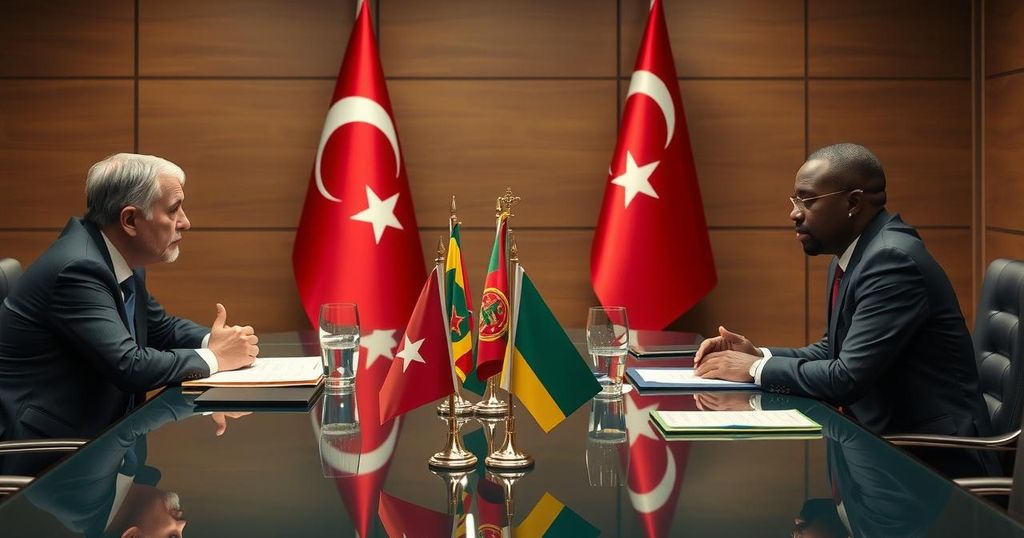Turkey Mediates Key Agreement to Resolve Ethiopia-Somalia Tensions

Ethiopian President Abiy Ahmed and Somali President Hassan Sheikh Mohamud have reached a significant agreement, mediated by Turkish President Recep Tayyip Erdoğan, to resolve a yearlong dispute concerning Ethiopia’s access to the Arabian Sea. The agreement, prompted by Ethiopia’s lease of a port in Somaliland, aims to ease tensions and foster economic development while placing Turkey in a pivotal role as a regional mediator.
Ethiopian President Abiy Ahmed and Somali President Hassan Sheikh Mohamud have concluded a significant agreement aimed at resolving a yearlong conflict concerning Ethiopia’s access to the Arabian Sea. This deal was announced in Ankara after extensive discussions facilitated by Turkish President Recep Tayyip Erdoğan, who is establishing Turkey’s role as a prominent mediator in the Horn of Africa region.
The underlying conflict stems from Ethiopia being the most populous landlocked country globally since Eritrea’s independence in 1993. The absence of a major seaport has hampered Ethiopia’s development. In January, Ethiopia agreed to lease a port from Somaliland, a breakaway region of Somalia, in exchange for acknowledging its independence. This arrangement triggered Somalia’s threat to withdraw Ethiopian troops stationed in the country to combat al-Shabab militants, raising concerns about a potential resurgence of violence reminiscent of the 1977-78 Ogaden War.
Turkey’s involvement is largely motivated by its historical and strategic ties to both Ethiopia and Somalia. It maintains its largest overseas military base in Somalia, where Turkish forces have successfully trained numerous Somali military personnel. Additionally, Turkey has supported the Ethiopian government in the Tigray conflict by supplying advanced drones.
According to Eurasia Group expert Emre Peker, “The agreement will help make Turkey into an even more relevant power in the region, with Ankara pitching itself as a security partner for African countries.” Turkish investments in Ethiopia exceed $2 billion, second only to Chinese investments.
Peker further remarks, “Aside from expanding its diplomatic and political clout in Africa, the deal will also help Turkey build more commercial inroads in the region. Ethiopian access to Somali ports could facilitate more trade, and Turkish businesses will benefit from potential preferential treatment on marquee infrastructure projects.”
Technical discussions are anticipated to occur in February to refine the specifics of the port access provisions. Their outcomes may have significant implications for regional stability and trade dynamics.
In summary, the agreement reached between Ethiopia and Somalia, under Turkey’s mediation, is a crucial step toward resolving longstanding tensions over port access. It reflects Turkey’s growing influence in the Horn of Africa and highlights the interdependent nature of security and economic interests in the region.
The strife between Ethiopia and Somalia relates to Ethiopia’s critical need for a maritime supply route following its landlocked status since Eritrea’s secession in 1993. The recent agreements aiming to provide Ethiopia with access to Somali ports could potentially enhance trade opportunities while addressing security concerns related to al-Shabab. Turkey’s active role in mediating this conflict stems from its historical alliances, military engagement, and substantial economic investments in both countries, showcasing its intent to position itself as a key actor within African geopolitics.
The mediation by Turkey resulting in the agreement between Ethiopia and Somalia marks a pivotal moment in both nations’ efforts to ensure stability and enhance trade routes through improved port access. This development not only underscores the interconnectedness of regional diplomacy but also reflects Turkey’s expanding influence as a mediator and partner in the Horn of Africa, potentially leading to enhanced commercial relationships and regional security.
Original Source: www.gzeromedia.com








